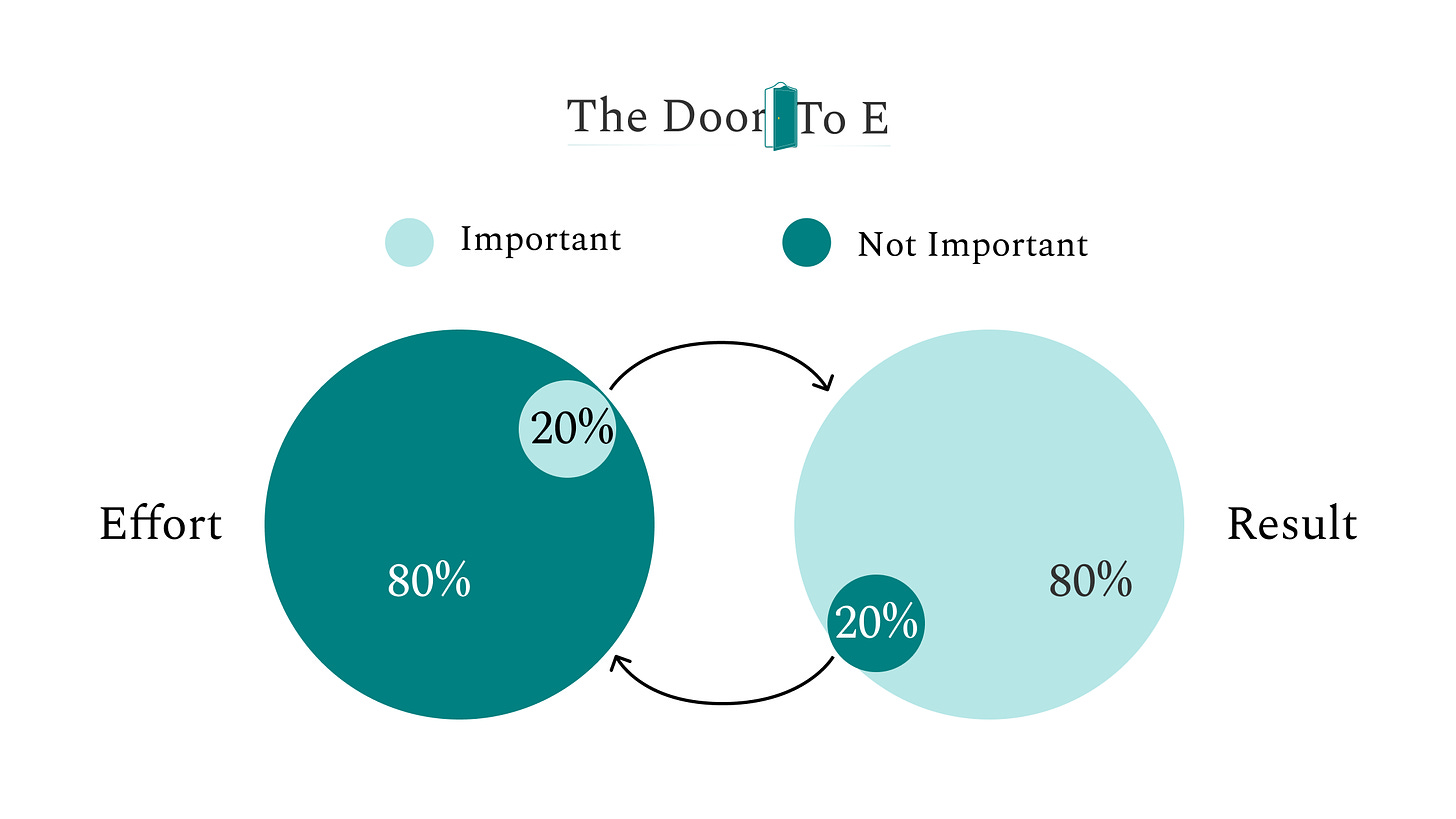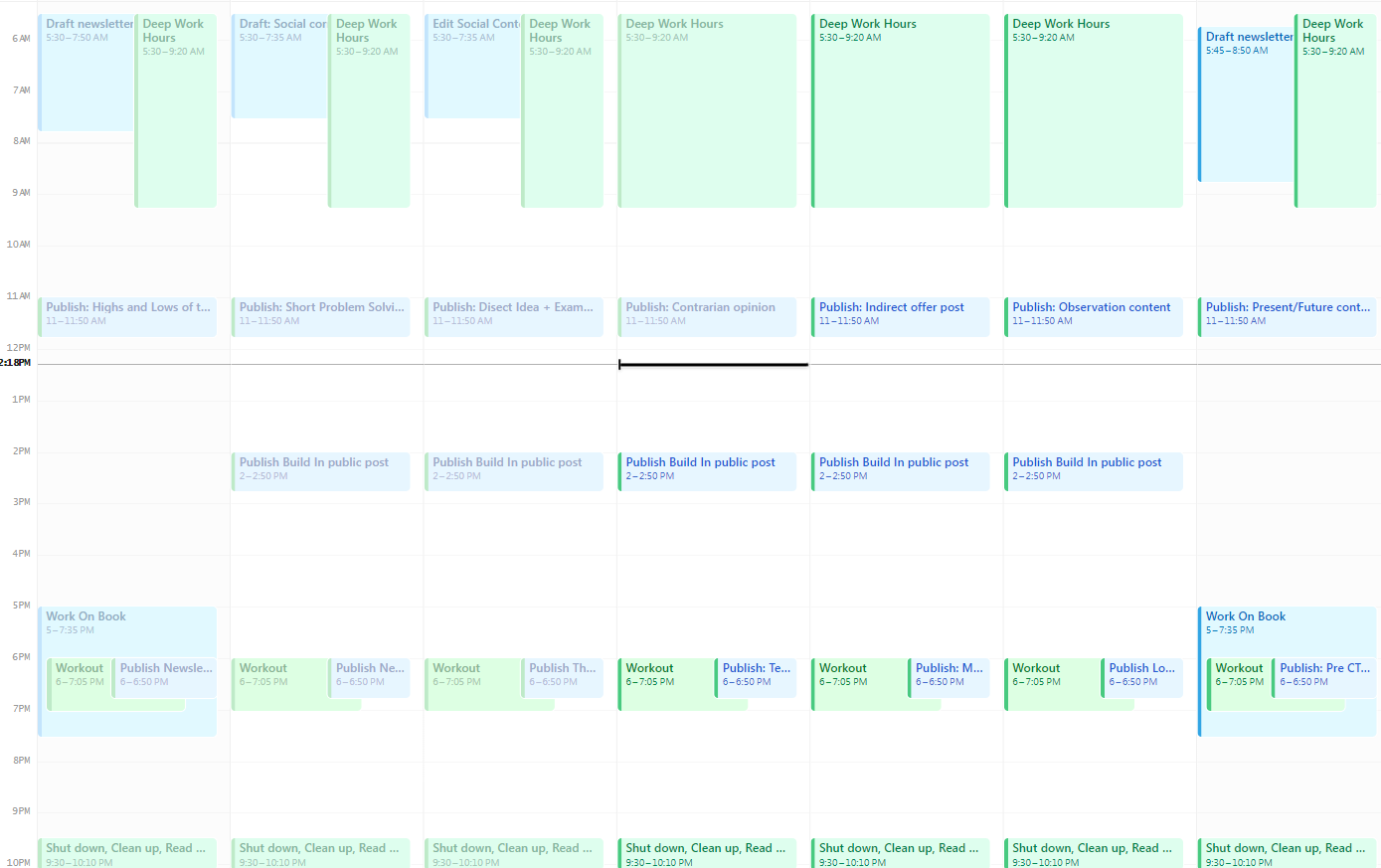Welcome to The Door to E. A series-style newsletter for people obsessed with exploring, explaining, and expanding ideas to unlock human potential. Each week, I publish around 3 chosen series that share ideas, experiences, and stories to help you design your life.
This essay is a part of the Mental Model Wednesday series.
Thank you for reading, and please forward this to anyone who you think needs to walk on the journey.
Dear Friends, Seekers, and Everyone else.
I'm pretty much messed up. My back and wrists feel like they aren't there anymore, at least I wish they weren't because of how much they hurt by pulling in insane levels of work.
I couldn't even sleep right thanks to it.
With building a product, researching for a workshop, and thinking up ways to increase distribution things went out of hand for my brain (as weird as that sounds, I don't have any other way to convey this)
So I have to stop working and be effective, that's where the Pareto Principle comes in.
This can save your precious mind
The human brain sucks at judging how much it can handle at a given moment. And on almost every occasion you (and your) brain either completely overestimate or underestimate your abilities to do work.
And even worse, sometimes people (like me) start doing things that don't amount to the larger goal in mind or the purpose you are following through.
And when you realize that you are not getting anywhere near where you want to, because you didn't focus on the right things... you'll go down a heinous trip.
The core of the Pareto Principle does just that.
A principle that asserts that 80% of the outcomes result from 20% of all causes for any given event.
For this same reason, this principle is also called the 80/20 principle.
What most people get wrong
The moment someone says 80% outcomes come from 20% effort, people assume this is a hard and fast rule.
And the most rough, batshit, screwed-up view on this I've seen personally when working with people is "if only 20% of the things actually matter, then the other 80% must not be important." Really?
Can you tell a surgeon that only surgery is important, the suturing, the anesthetic, and everything else should be thrown out the window?
The 80% can be important. The rule doesn't tell you to omit any task. So keep that in mind when you blatantly slash away at your to-do list the next time you think of doing less work for more important reasons.
You might have to do less work more often than the rest of it.
And one other thing... The Pareto principle is not a mathematical law.
It stems from Macroeconomics, around the distribution of wealth in the early 20th century. So to condense his results from a large population and distribution of wealth, Vilfredo Pareto (the Italian economist this law is named after) generalized his results into a statement to summarize his analysis.
The good thing though...
At its heart, the rule places importance on doing the needle-moving tasks, exerting energy on things you can control instead of the ones you can't..
As I said earlier, it doesn't mean ignoring less successful areas, it’s just about solving the problems that reveal themselves naturally and not worrying about the things that haven't happened yet.
How do you use it?
That's the best part, you don't need a fancy setup or weeks of planning or serious strategy sessions. It's just a simple 3 step process
Identify your priorities - You can use Eisenhower matrix to find your priorities and rank your to-do list based on importance. You can also block time in your deep work sessions to make things more effective
Simplify and eliminate - I use the Warren Buffet 2 list strategy. List down 25 goals and only focus on the top 5. The less you have to work on the better your output will be. And if things are not in the top 5 of your goal list, they don't belong in your life anyway.
Leverage Strength - We focus on our weaknesses more than we do on our strengths. Capitalize on what you are good at to maximize your chances of success.
This process only improves if you monitor your processes and performance to see how the results are shaping up to fit your goal and intent.
2 ways I use the 80/20 Principle
While this is an amazing principle to optimize your life in general, I don't use it as often. Because an over-optimized life is the enemy of creativity.
So the only 2 ways I use this principle is
1. Productivity
Believe it or not, I WORK only 6 hours a day. And no I'm not being lazy, it is by design.
I don't have a huge list of tasks in a given week. I play with 3 areas of work every week aside from the stuff that I must do out of habit like using social media, creating content, and building business assets.
But most of the time I use this rule to set up my calendar. I like to keep things light and breeze and my calendar reflects that by being mostly empty.
The fewer work hours you assign, the more creative solutions you will find for your work. For instance, how can I write 1 essay every day and still manage to be active on Twitter and Substack to at least find new pieces of content and people to interact with?
How can I squeeze in working on my info product builder kit while still writing a 1000+ word essay every other day? How can I ensure the quality of content remains the same across all social media that I am on?
Maintaining quality becomes simple when you set rules for your actions
While I write I think
Am I writing the way I think?
Did I stumble and delete my work because I was chasing perfection?
Do I Write and edit at the same time?
there's a lot more stuff to it.
But I've learned that 6 hours a day for 7 days a week gives me 7 different zones of deep work that I can individually assign to 1 or 2 tasks at max to keep things from going south.
If I can reduce the amount of variation in the flow of work, I get a much better outcome.
2. Decision making
I still can't wrap my head around this, how do you make the best decision you can? What should I focus on when I have 3 important things going on that are all interdependent? What should I do first?
It's times like these that I stop thinking in my brain and start thinking on paper. I try to look at things taking the least damage.
What can I do later or push the deadline for?
What is something that is necessary for momentum?
What is something that can be done slowly and over time?
Since I'm already moving in minimal goals capacity, I don't have the problem of eliminating tasks, cause I am already dealing with the bare minimum. All I have to do is worry about its placement in the race of completion.
Final Words
The point of having the 80/20 split is to prioritize tasks that you can control and that make a difference. Which I'm realizing, I should be doing more of as I am typing this.
I should do more outreach, more offers, more long forms, and maybe videos or podcasts. Simplifying the work that I can do would make me (and you) more effective.
Don't do things that won't matter in 5 years.
until next time
Be weird and curiosity
S
P.S. If you are interested in info products and building an information-led creator business, check out Wide Thinker Letters. Series issues go out every Sunday.
If you haven't already, subscribe to the newsletter and hop on the learning journey with me to unlock your potential.





